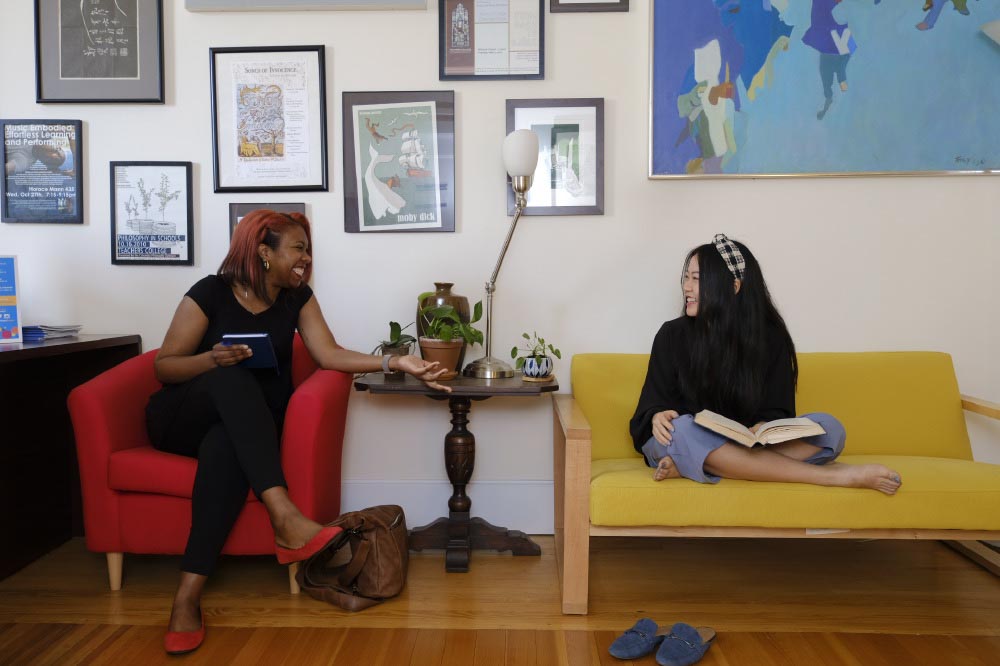Master of Arts in Communication and Education

Admission Information
Displaying requirements for the Spring 2025, Summer 2025, and Fall 2025 terms.
Master of Arts
- Points/Credits: 32
- Entry Terms: Fall
- Enrollment Formats: Full-Time Campus-Based, Part-Time Campus-Based
Application Deadlines
| Entry Term Available | Priority Deadlines | Final Deadlines | Extended Deadlines |
|---|---|---|---|
| Spring | N/A | N/A | N/A |
| Summer | N/A | N/A | N/A |
| Fall | January 15, 2025 | January 15, 2025 | N/A |
Select programs remain open beyond our standard application deadlines, such as those with an extended deadline or those that are rolling (open until June or July). If your program is rolling or has an extended deadline indicated above, applications are reviewed as they are received and on a space-available basis. We recommend you complete your application as soon as possible as these programs can close earlier if full capacity has been met.
Application Requirements
| Requirement | |
|---|---|
| Online Degree Application, including Statement of Purpose and Resume | |
| Transcripts and/or Course-by-Course Evaluations for all Undergraduate/Graduate Coursework Completed | |
| Results from an accepted English Proficiency Exam (if applicable) | |
| $75 Application Fee | |
| Two (2) Letters of Recommendation | |
| Video essay required for all non-native English speakers (included in online application) |
For admission-related inquiries, please contact MSTadmission@tc.columbia.edu.
Requirements from the TC Catalog (AY 2024-2025)
Displaying catalog information for the Fall 2024, Spring 2025 and Summer 2025 terms.
The Communication and Education Master of Arts degree program relies primarily on social science inquiry to understand, interpret, and shape how information, communication technologies and new media influence culture and education, including areas such as literacy, social justice, youth development, and teacher education.
This program uses a broad range of methods -- including both qualitative and quantitative approaches -- to study the intersections of communication and learning. It asks, in particular, how education and other social systems change under the impact of emerging media. The program encourages students to:
-
Reflect on the historical, cultural and social impact of a wide range of media
-
Leverage relevant research methods and modes of inquiry to better understand how communication and media use shape learning practices
-
Attend closely to both technological artifacts and human activity, reflecting on the diverse ways in which modes of communication condition the meanings actually, and potentially, communicated—particularly through the wide variety of digital means available to us.
Students graduating from the M.A. degree program in Communication and Education have pursued a wide variety of career paths, in accordance with their goals and interests. Some of these include:
-
Teaching and research positions in higher education;
-
Working in schools, museums or other educational institutions to leverage new media technologies in effective and empowering ways;
-
Conducting formative and evaluative research on the use of media in/for learning, both within classrooms and beyond;
-
Designing and implementing innovations in the use of new media for educational, social or civic purposes; or
-
Working in government or nonprofit settings to shape the conversation around new media and learning through research and policy work.
Master of Arts (32 points required)
To earn the Master of Arts (M.A.), degree students must satisfactorily complete 32 points of coursework and an integrative project. In CMLTD programs, the M.A. degree serves two main functions: a mark of entry-level professional qualifications in the fields covered and a grounding for further, more advanced specialization in the field.
Students must take coursework totaling at least 32 points. The following are required:
Core Requirement: (1 point)
-
MSTU 4000 is a requirement for 1 credit in the first semester of study.
-
MSTU 4900 IP Seminar is a requirement for 0 credits in the last semester of study.
Foundational Knowledge: At least three areas must be represented. (9 points)
-
Cognitive Issues and Technology
-
MSTU 4133 Cognition and Computers
-
MSTU 4088 Introduction to Learning Sciences and Educational Technology
-
Social Issues and Technology
-
MSTU 4005 Equity, Ethical, and Social Issues in Educational Technology
-
MSTU 4020 Social and Communicative Aspects of the Internet
-
Cultural Issues and Technology
-
MSTU 4028 Technology and Culture
-
MSTU 5002 Culture, Media, and Education
-
Educational Practice and Design
-
MSTU 4001 Technology and School Change
-
MSTU 4050 Online Schools and Online Schooling K-12
-
MSTU 4083 Instructional Design of Educational Technology
Breadth Requirement: (6 points)
All students (at both master’s and doctoral levels) must complete 6 points at Teachers College outside of the Communication, Media and Learning Technologies Design Program (that is, courses with a prefix other than MSTU).
Additional Requirements: for M.A. students in Communication and Education (TECM)
-
MSTU 4016 The History of Communication
-
13 points additional MSTU courses
-
Other courses chosen in consultation with an advisor
Integrative M.A. Project
Candidates for the M.A. degree are expected to culminate their work with an integrative project. Projects vary but share the common following features:
-
Empirically based and grounded in the research literature
-
Address a problem or phenomenon of the student's interest and area of study
-
Provide a solution to the problem.
Some examples include:
-
Design of new learning technologies and media-driven experiences
-
Development of new models, curriculum, and/or lessons integrating technology
-
A thesis or case study analysis of a trend in the field of learning technology
Specifics of the integrative project are determined through discussions with the students' advisors. In addition, because experientially-grounded learning is invaluable preparation for professional practice, students are strongly advised to take fieldwork or internships as an integral part of their master’s program.
For students completing only the M.A. degree program, this project should be related to their career goals and should provide tangible evidence of their skills and strengths.